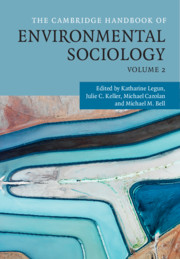Book contents
- The Cambridge Handbook of Environmental Sociology Volume 2
- The Cambridge Handbook of Environmental Sociology
- Copyright page
- Contents
- Figures
- Tables
- Contributors
- Foreword
- Introduction
- Part I Methods
- Part II Embodied Environmental Sociology
- Part III Beyond the Human
- Part IV Sustainability and Climate Change
- Part V Resources
- 18 Enclosing Water: Privatization, Commodification, and Access
- 19 Speech Is Silver, Silence Is Gold in the Fracking Zone
- 20 Environmental Sociology and the Genomic Revolution
- 21 The Future Is Co-Managed: Promises and Problems of Collaborative Governance of Natural Resources
- Part VI Food and Agriculture
- Part VII Social Movements
- Index
- References
21 - The Future Is Co-Managed: Promises and Problems of Collaborative Governance of Natural Resources
from Part V - Resources
Published online by Cambridge University Press: 05 November 2020
- The Cambridge Handbook of Environmental Sociology Volume 2
- The Cambridge Handbook of Environmental Sociology
- Copyright page
- Contents
- Figures
- Tables
- Contributors
- Foreword
- Introduction
- Part I Methods
- Part II Embodied Environmental Sociology
- Part III Beyond the Human
- Part IV Sustainability and Climate Change
- Part V Resources
- 18 Enclosing Water: Privatization, Commodification, and Access
- 19 Speech Is Silver, Silence Is Gold in the Fracking Zone
- 20 Environmental Sociology and the Genomic Revolution
- 21 The Future Is Co-Managed: Promises and Problems of Collaborative Governance of Natural Resources
- Part VI Food and Agriculture
- Part VII Social Movements
- Index
- References
Summary
In recent years, natural resource governance has become an important site of creative experimentation in both wealthy and developing countries. Among these are experiments in adaptive co-management (ACM), which are intended to mobilize and coordinate the knowledge, capacities, and authority of senior governments with those of local users and communities. This is difficult to do in practice, and a number of important critiques of ACM policies have advanced our knowledge of the promises and problems of this approach. However, I argue that ACM experimentation has deep significance for environmental sociology, given its engagement with some important social-ecological challenges, including environmental justice, knowledge, rights, and democracy. ACM experiments involve the interplay of the ideal and the material, society’s constructions and nature’s constructions, local livelihoods and global flows. Moreover, ACM initiatives are an important counter-current in an era of neoliberal dominance in environmental policy, eschewing market-based instruments in favor of process-based approaches to translating plural knowledges, values, and interests into context-sensitive governance frameworks and decisions. While natural resources have traditionally been seen as a peripheral topic in environmental sociology, I argue that there is much for environmental sociologists to learn and contribute to these fascinating experiments in collaborative environmental governance.
Keywords
- Type
- Chapter
- Information
- The Cambridge Handbook of Environmental Sociology , pp. 360 - 374Publisher: Cambridge University PressPrint publication year: 2020
References
- 2
- Cited by



